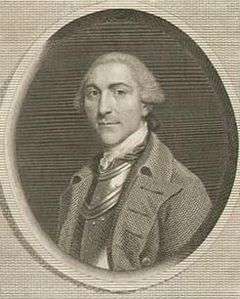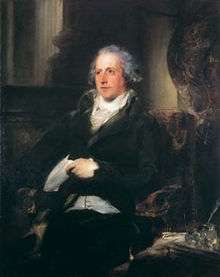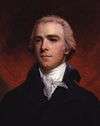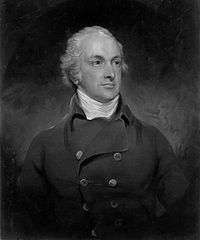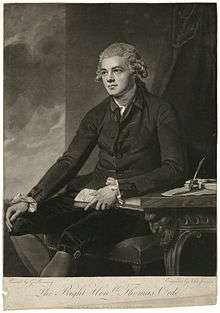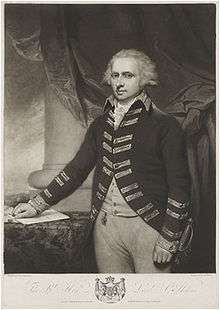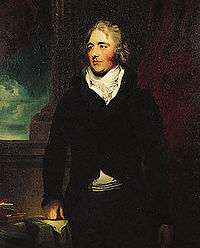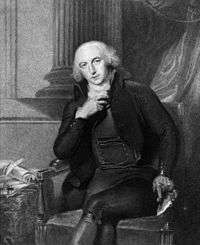List of Chief Secretaries for Ireland
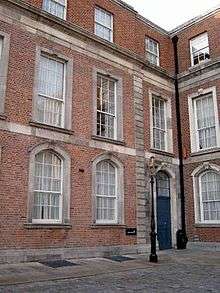
The Chief Secretary's residence was the Chief Secretary's Lodge in the Phoenix Park, next to the Viceregal Lodge.
The following contains a list of Chief Secretaries of Ireland.The list includes holders of a key political office in the British administration in Ireland. Nominally subordinate to the Lord Lieutenant, from the late 18th century until the end of British rule he was effectively the government minister with responsibility for governing Ireland; usually it was the Chief Secretary, rather than the Lord Lieutenant, who sat in the British Cabinet.[1] Exceptions were the periods from 29 June 1895 to 8 August 1902, when the Lord Lieutenant Lord Cadogan sat in the Cabinet and the Chief Secretaries Gerald Balfour until 9 November 1900 did not sit there and George Wyndham from that date also sat there,[2] and from 28 October 1918 to 2 April 1921, when both the Lord Lieutenant Lord French and the Chief Secretaries Edward Shortt, Ian Macpherson and Sir Hamar Greenwood sat in the Cabinet.[3]
British rule over much of Ireland came to an end as the result of the Irish War of Independence, which culminated in the establishment of the Irish Free State. In consequence the office of Chief Secretary was abolished, as well as that of Lord Lieutenant. Executive responsibility within the Irish Free State and Northern Ireland was effectively transferred to the President of the Executive Council (i.e. the prime minister) and the Prime Minister of Northern Ireland respectively.
Chief Secretaries for Ireland
1566–1660
| Name | Portrait | Entered office | Left office | Served under |
|---|---|---|---|---|
| Edward Waterhouse[4] |  |
20 January 1566 | 9 October 1567 | Sir Henry Sidney |
| Edward Waterhouse (second time)[4] |
 |
28 October 1568 | Sir Henry Sidney | |
| Edmund Tremayne |  |
15 July 1569 | 31 March 1571 | Sir Henry Sidney |
| Philip Williams |  |
post March 1571 | 17 September 1575 | Sir William Fitzwilliam |
| Edmund Molyneux |  |
18 September 1575 | Sir Henry Sidney | |
| Edmund Spenser | |
7 September 1580 | 30 August 1582 | The Lord Grey de Wilton |
| Philip Williams |  |
21 June 1584 | 10 August 1594 | Sir John Perrot Sir William FitzWilliam |
| Richard Cooke[5] |  |
11 August 1594 | 21 May 1597 | Sir William Russell |
| Philip Williams |  |
22 May 1597 | 13 October 1597 | The Lord Burgh |
| Henry Wotton |  |
15 April 1599 | 4 September 1599 | The Earl of Essex |
| Francis Mitchell |  |
28 February 1600 | March 1600 | The Lord Mountjoy |
| George Cranmer |  |
March 1600 | Died 16 July 1600 | The Lord Mountjoy |
| Fynes Moryson |  |
14 November 1600 | 31 May 1603 | The Lord Mountjoy |
| John Bingley |  |
1 June 1603 | 2 February 1605 | Sir George Carey |
| Henry Piers |  |
3 February 1605 | 10 February 1616 | Sir Arthur Chichester |
| Henry Holcroft[6] |  |
30 August 1616 | 3 May 1622 | Sir Oliver St John |
| Sir John Veele |  |
8 September 1622 | 25 October 1629 | The Viscount Falkland |
| George Lane |  |
21 January 1644 | April 1646 | The Marquess of Ormonde |
1660–1701
| Name | Portrait | Entered office | Left office | Served under |
|---|---|---|---|---|
| Matthew Locke |  |
1660 | 1660 | The Lord Robartes |
| Sir Thomas Page |  |
1662 | 1669 | The Duke of Ormonde: The Earl of Ossory |
| Henry Ford |  |
1669 | 1670 | The Lord Robartes |
| Sir Ellis Leighton |  |
1670 | 1672 | The Lord Berkeley of Stratton |
| Sir Henry Ford |  |
1672 | 1673 | The Earl of Essex |
| William Harbord |  |
1673 | 1676 | The Earl of Essex |
| Sir Cyril Wyche |  |
1677 | 1682 | The Duke of Ormonde |
| Sir William Ellis |  |
1682 | 1685 | The Duke of Ormonde |
| Sir Paul Rycaut | 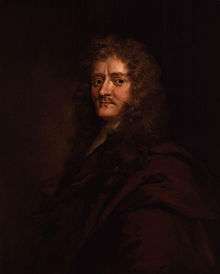 |
1686 | 1687 | The Earl of Clarendon |
| Thomas Sheridan |  |
1687 | 1688[7] | The Earl of Tyrconnell |
| Bishop Patrick Tyrrell |  |
1688 | 1689 | The Earl of Tyrconnell |
| John Davis |  |
1690 | 1692 | |
| Sir Cyril Wyche |  |
1692 | 1693[8] | The Viscount Sydney |
| Sir Richard Aldworth |  |
1693 | 1696 | The Lord Capell |
| William Palmer |  |
1696 | 1697 | |
| Matthew Prior |  |
1697 | 1699 | |
| Humphrey May |  |
1699 | 1701 |
1701–1750
1750–1801
1801–1852
| Name | Portrait | Entered office | Left office | Political party | |
|---|---|---|---|---|---|
| Charles Abbot |  |
1801 | 1802 | Tory | |
| William Wickham |  |
1802 | 1804 | Tory | |
| Sir Evan Nepean, Bt | |
1804 | 1805 | Tory | |
| Nicholas Vansittart | 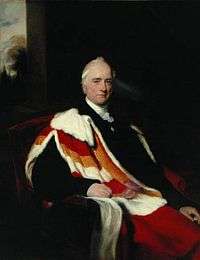 |
1805 | 1805 | Tory | |
| Charles Long | 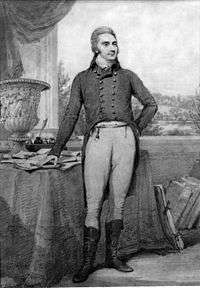 |
1805 | 1806 | Tory | |
| William Elliot |  |
1806 | 1807 | Whig | |
| Sir Arthur Wellesley |  |
1807 | 1809 | Tory | |
| Robert Dundas | 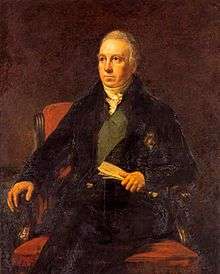 |
1809 | 1809 | Tory | |
| William Wellesley-Pole | 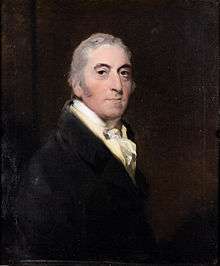 |
1809 | 1812 | Tory | |
| Robert Peel |  |
1812 | 1818 | Tory | |
| Charles Grant |  |
1818 | 1821 | Tory | |
| Henry Goulburn | 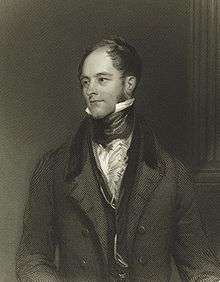 |
1821 | 1827 | Tory | |
| William Lamb | 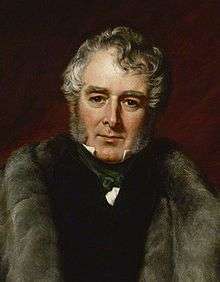 |
29 April 1827 | 21 June 1828 | Whig | |
| Lord Francis Leveson-Gower |  |
21 June 1828 | 30 July 1830 | Tory | |
| Sir Henry Hardinge | 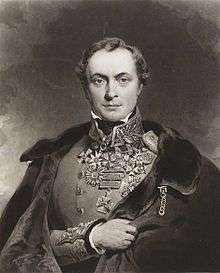 |
30 July 1830 | 15 November 1830 | Tory | |
| Edward Smith-Stanley | 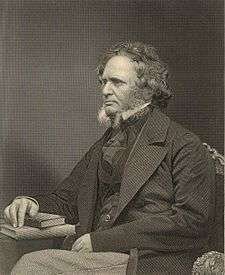 |
29 November 1830 | 29 March 1833 | Whig | |
| Sir John Hobhouse, Bt | 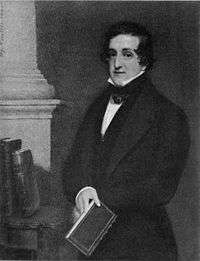 |
29 March 1833 | May 1833 | Whig | |
| Edward Littleton | 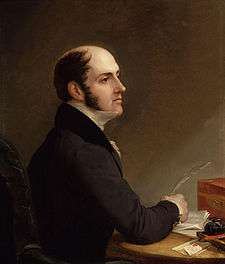 |
May 1833 | 14 November 1834 | Whig | |
| Sir Henry Hardinge |  |
16 December 1834 | 8 April 1835 | Conservative | |
| Viscount Morpeth |  |
22 April 1835 | 30 August 1841 | Whig | |
| Lord Eliot |  |
6 February 1841 | 1 February 1845 | Conservative | |
| Sir Thomas Fremantle, Bt | 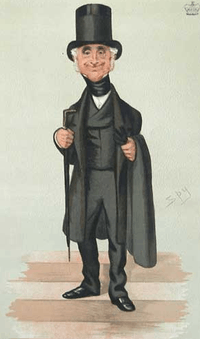 |
1 February 1845 | 14 February 1846 | Conservative | |
| The Earl of Lincoln |  |
14 February 1846 | June 1846 | Conservative | |
| Henry Labouchere |  |
6 July 1846 | 22 July 1847 | Whig | |
| Sir William Somerville, Bt |  |
22 July 1847 | 21 February 1852 | Whig | |
1852–1900
| Name | Portrait | Entered office | Left office | Political party | |
|---|---|---|---|---|---|
| Lord Naas |  |
1 March 1852 | 17 December 1852 | Conservative | |
| Sir John Young, Bt | 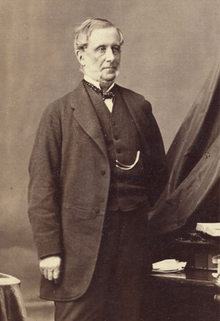 |
6 January 1853 | 30 January 1855 | ||
| Edward Horsman | %2C_by_Southwell_Brothers%2C_c.1862-4.jpg) |
1 March 1855 | 27 May 1857 | Whig | |
| Henry Arthur Herbert |  |
27 May 1857 | 21 February 1858 | Whig | |
| Lord Naas |  |
4 March 1858 | 11 June 1859 | Conservative | |
| Edward Cardwell |  |
24 June 1859 | 29 July 1861 | Liberal | |
| Sir Robert Peel, Bt | %2C_by_Camille_Silvy.jpg) |
29 July 1861 | 7 December 1865 | Liberal | |
| Chichester Parkinson-Fortescue | 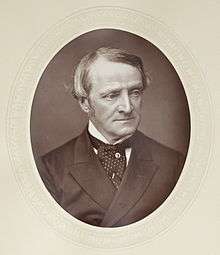 |
7 December 1865 | 26 June 1866 | Liberal | |
| The Earl of Mayo |  |
10 July 1866 | 29 September 1868 | Conservative | |
| John Wilson-Patten |  |
29 September 1868 | 1 December 1868 | Conservative | |
| Chichester Parkinson-Fortescue |  |
16 December 1868 | 12 January 1871 | Liberal | |
| Marquess of Hartington |  |
12 January 1871 | 17 February 1874 | Liberal | |
| Sir Michael Hicks-Beach, Bt | .jpg) |
27 February 1874 | 15 February 1878 | Conservative | |
| James Lowther |  |
15 February 1878 | 21 April 1880 | Conservative | |
| William Edward Forster | 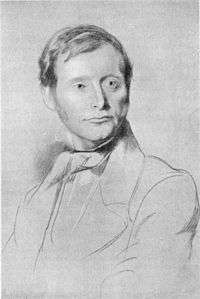 |
30 April 1880 | 6 May 1882 | Liberal | |
| Lord Frederick Cavendish | %2C_by_John_D._Miller%2C_pubd_1883_(after_Sir_William_Blake_Richmond%2C_exh._RA_1874).jpg) |
6 May 1882 | 6 May 1882 | Liberal | |
| George Trevelyan | 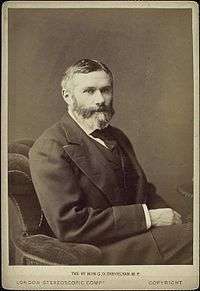 |
9 May 1882 | 23 October 1884 | Liberal | |
| Henry Campbell-Bannerman | 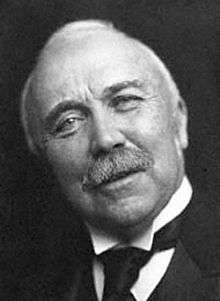 |
23 October 1884 | 9 June 1885 | Liberal | |
| Sir William Hart Dyke, Bt | 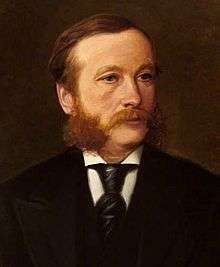 |
25 June 1885 | 23 January 1886 | Conservative | |
| William Henry Smith | .jpg) |
23 January 1886 | 28 January 1886 | Conservative | |
| John Morley | 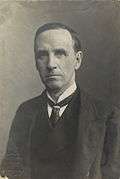 |
6 February 1886 | 20 July 1886 | Liberal | |
| Sir Michael Hicks-Beach, Bt | .jpg) |
5 August 1886 | 7 March 1887 | Conservative | |
| Arthur Balfour | 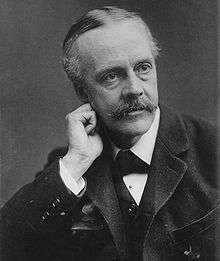 |
7 March 1887 | 9 November 1891 | Conservative | |
| William Jackson | |
9 November 1891 | 11 August 1892 | Conservative | |
| John Morley |  |
22 August 1892 | 21 June 1895 | Liberal | |
| Gerald Balfour | 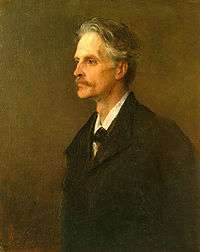 |
4 July 1895 | 9 November 1900 | Conservative | |
1900–1922
| Name | Portrait | Entered office | Left office | Political party | |
|---|---|---|---|---|---|
| George Wyndham | 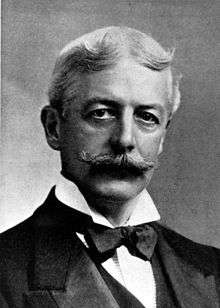 |
9 November 1900 | 12 March 1905 | Conservative | |
| Walter Long |  |
12 March 1905 | 4 December 1905 | Conservative | |
| James Bryce | 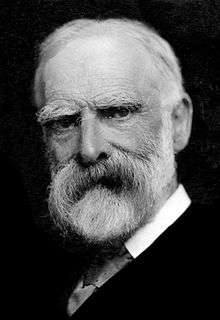 |
10 December 1905 | 23 January 1907 | Liberal | |
| Augustine Birrell |  |
23 January 1907 | 3 May 1916 | Liberal | |
| Henry Duke | 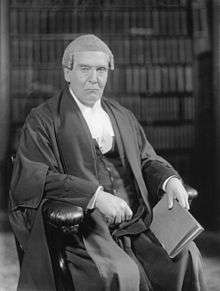 |
31 July 1916 | 5 May 1918 | Conservative | |
| Edward Shortt |  |
5 May 1918 | 10 January 1919 | Liberal | |
| Ian Macpherson | 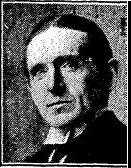 |
10 January 1919 | 2 April 1920 | Liberal | |
| Sir Hamar Greenwood, Bt | .jpg) |
2 April 1920 | 19 October 1922 | Liberal | |
References
- ↑ Quinlan, Tom. "The Registered Papers of the Chief Secretary's Office". National Archives of Ireland. Retrieved 7 June 2011.
- ↑ Chris Cook and Brendan Keith, British Historical Facts 1830–1900, Macmillan, 1975, pages 45–46
- ↑ British Political Facts 1900–1994, by David Butler and Gareth Butler (Macmillan Press, 7th edition 1994) Page7.
- 1 2 Handbook of British Chronology calls him 'Sir Edward Waterhouse', but he was not knighted until 1584
- ↑ Handbook of British Chronology calls him 'Sir Richard Cooke', but he was not knighted until 1603 – see History of Parliament – Member Biographies
- ↑ knighted 1 May 1622 – see History of Parliament – Member Biographies
- ↑ 'removed from his offices on 20 January 1688' John Miller, ‘Sheridan, Thomas (1646–1712)’, Oxford Dictionary of National Biography, Oxford University Press, Oct 2006 , accessed 3 Aug 2014
- ↑ 'Following Sidney's removal as lord lieutenant in 1693 Wyche was appointed one of three lords justices to take over the chief governorship of Ireland.'C. I. McGrath, ‘Wyche, Sir Cyril (c.1632–1707)’, Oxford Dictionary of National Biography, Oxford University Press, 2004 , accessed 3 Aug 2014
- ↑ In July 1767 he resigned, having quarrelled with his brother over his own continuing attachment to George Grenville. Ruddock Mackay, ‘Hervey, Augustus John, third earl of Bristol (1724–1779)’, Oxford Dictionary of National Biography, Oxford University Press, 2004; online edn, Sept 2010, accessed 3 Aug 2014
- British Historical Facts 1760–1830, by Chris Cook and John Stevenson (The Macmillan Press 1980) ISBN 0-333-21512-5 (includes list of Chief Secretaries on page 31)
- British Historical Facts 1830–1900, by Chris Cook and Brendan Keith (The Macmillan Press 1975) ISBN 0-333-13220-3 (includes list of Chief Secretaries on pages 52–53)
- Twentieth-Century British Political Facts 1900–2000, by David Butler and Gareth Butler (Macmillan Press, Eighth edition 2000) ISBN 0-333-77222-9 paperback (includes list of Chief Secretaries on page 61)
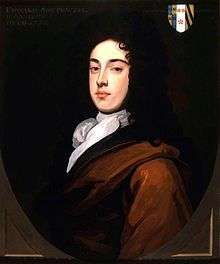

_-_brat_Sir_Roberta.jpg)
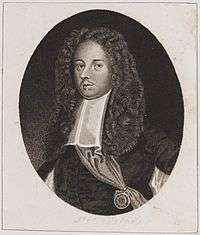
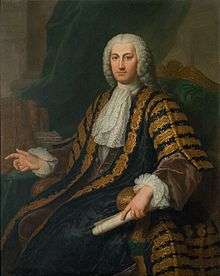
.jpg)
